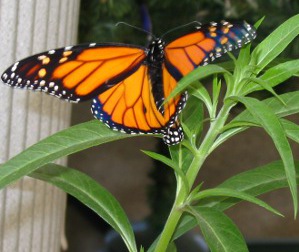|
The summer garden is the perfect place to relax and refresh after the festive season.
Roses are in full bloom, Monarch butterflies are in the air and mouth watering tomatoes are being harvested. It?s time to reap the rewards of your hard work, and with a few touches of general maintenance your garden will look fantastic all summer long.
|
|
Summer weather can be variable, but with our usual long hot dry days, watering is the key ingredient for a healthy garden. Water early in the morning or in the evening. Watering during the heat of the day will only burn your plants. Where possible, water the soil around the base of plants as watering the foliage may create the right conditions for fungal infections. Pots, planters and hanging baskets will need to be watered daily.
Mulching garden beds will help to conserve moisture and condition the soil. Mulch around the drip line of trees and shrubs. Be careful not to cover the trunks of plants. We recommend using Daltons Premium Compost.
Avoid cutting lawns too closely-leaving some length will prevent lawn from drying out.
The Edible Garden
- January is the month to plant leeks.Locally grown leeks are available all month.Regular harvesting of quick producing crops is the key to this month - courgettes, cucumbers, gherkins, beans, peas all need checking and picking on a daily basis. This will keep your veges young and sweet and stop them getting too big! It will also encourage plants to keep on producing for many more weeks.
- To prevent powdery mildew on you cucumbers and courgettes spray with Yates Greenguard fungicide. Blight may be a problem for tomatoes. Aim to prevent this disease by watering the ground around the tomato rather than on the tomato plant. For infected plants, spray with Yates Copper Oxychloride at recommended rate.
- Control white butterfly caterpillars with Success Naturalyte.
- Plant successional crops of quick growing summer veges such as lettuce, beetroot, radishes, silver beet, bok choy. Now is also a good time to plant seedlings of the first of the autumn/winter veges - cabbage, cauliflower, leeks, spinach.
- Feed your veges with Miracle Gro.
- Continue to water regularly, especially if the summer is dry. Remember a good deep watering around the roots of the plants 2-3 times per week is more beneficial than a daily light sprinkling.
- Adding compost and other organic material to the soil helps retain moisture as well as conditioning the soil.
- Check fruit trees for brown rot and black spot and spray with ?Fungus Fighter? if these are prevalent.
- Tomatoes will be ripening now. Thin out foliage around lower parts of the plants to allow light in and air around the fruit. This will speed up ripening and help keep diseases at bay.
- Garlic and onions can be lifted now and laid out to dry.
- Harvest new potatoes as flowering finishes.
- Collect herbs for drying or making pesto and freezing.
Basil Pesto
- Into the food processor put;
- 2 packed cups of basil leaves
- 2 large cloves garlic, peeled and sliced
- ? cup olive oil
- ? cup fresh parmesan
- ? cup toasted pine nuts
- Salt and Pepper
- Blend all together ? freeze in ice cube trays, then pack free flow in bags in freezer to use as required.
The Flower Garden
- Fill gaps in the garden with instant potted colour - Zinnias, Dahlias, Marigolds, Salvias, and Petunias will all flower on for some time yet.
- Zinnias are great for providing summer colour. They also attract butterflies, bees, and birds to your garden.
- Plant Gazanias and Arctotis in drier, sunny spots of the garden for masses of bright colour during the hotter months.
- Keep dead heading flowering plants including roses - this will encourage more flowers to develop.
- When picking roses cut a reasonably long stem, making your cut just above an outward facing bud.
- Feed roses now with Rose food - this will encourage more flowers and new growth to harden before the first frosts.
- In warmer climes Hibiscus will be in full show. These respond well to plants food high in potash, such as citrus fertiliser. Remember to water well after feeding.
|
|
      |






